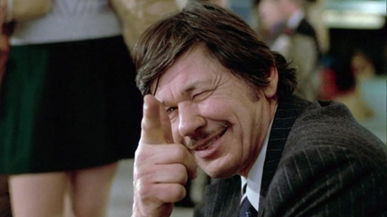Viking Night: Death Wish
By Bruce Hall
February 12, 2013
BoxOfficeProphets.com

If those seem like the kind of weighty questions that might make a great movie, you’re absolutely correct. Just don’t expect to see them pursued very seriously in Michael Winner’s revenge classic, Death Wish. Winner takes a cursory stab at it, using some quick establishing shots of a happy husband and wife on vacation before quickly returning to New York, dotted with row after row of decaying tenements, all filled with desperate criminals and long suffering innocents.
Islands good. City bad. Got it? Good.
The husband in question is Paul Kersey, a soft spoken architect who lives with his wife (Hope Lange) in a cozy Manhattan apartment. He’s just an ordinary guy with an ordinary office job, trying to make ends meet in a city choked with crime. Of course, because he’s played by Charles Bronson, Paul is built like a UFC striker and has a soldier’s thousand yard stare permanently etched onto his face. Both things will come in very handy later - but let’s not skip ahead.
While the Kerseys were on vacation, the crime rate in New York seems to have tripled. Dozens of people a week are being slaughtered by vicious street gangs that look fresh off a Mad Max casting call. It’s a little over the top, and in fact a brief, expository conversation near the top of the film is one of the last times you'll see Death Wish attempt to legitimately address the real world underpinnings of its plot. Unlike his coworkers, Paul is portrayed as a closet liberal who pities the less fortunate and tries his best to understand the root causes behind crime.
His beliefs are tested when his wife and daughter (Kathleen Tolan) are the victims of a home invasion, led by someone who looks an awful lot like Jeff Goldblum. When he arrives at the hospital with his son-in-law (Steven Keats), Paul discovers that his wife is dead and his daughter has been the victim of a horrifying sexual assault. He struggles to find justice through conventional means, but there's only so much ground the police can cover in a city of millions. Meanwhile, his daughter remains badly traumatized and his home feels like a tomb without the woman he loves.
He buries himself in his work. Then, on a business trip to Arizona, he spends some quality time with a client who happens to be a gun nut enthusiast. They have a Red State moment, during which Paul discovers some of the many explosive options available to those who wish to solve their problems through unconventional means. Suddenly, it turns out all that pansy liberal talk was a smokescreen. Just like that, Paul Kersey turns out to be a murder machine who can put a bullet up a June bug’s ass at 300 yards. He acquires a gleaming new hand cannon, which he casually carries through airport security because it's 1974. The film largely abandons objectivity to take up a darker, more controversial posture.
Still, for a short time Death Wish successfully portrays its protagonist as a broken, sympathetic man. His world has been shattered, and the justice system has seemingly walked away from the problem. When he finally takes to the streets looking for blood he finds it, and feels justified as he pumps round after round into his first victim. But taking a human life is not a line you just can step back across. You almost feel for Paul as he struggles - at first anyway - with the moral implications of what he's done. We even pause (briefly) to wonder whether fighting lawlessness with lawlessness is a battle of diminishing returns.
But it doesn’t last long. For the most part, Wendel Mayes' screenplay juggles some pretty complex social issues with all the nuance of a flaming jackhammer. The criminals are all portrayed as slavering lunatics; willful exaggerations designed to make the idea of vengeance seem less poisonous than it is. The script pays lip service to both sides of the issue, yet it revels openly in the idea of street justice, to a point just short of propaganda. There are many themes here, but no question where the movie stands.
Modern values are corrupt. The Old Ways are best. Vengeance is the Lord’s, unless the Lord is busy, and then it’s all yours. Whatever your problem is, one bullet can solve it. They should have just cast Charlton Heston in the lead and named the character Dick Flagg. I'm not saying there's anything wrong with a straight up revenge flick. But the social themes this movie pretends to explore aren’t potent enough to support the mindless brutality it clearly endorses. And there’s no winking irony, either. Death Wish doesn’t want you to think, it wants you to agree.
I'm not saying it's a terrible film. It's just not very good. Bronson himself makes a convincing killer, but he’s sure as hell no architect. To call his range “limited” is to call Bill Gates “moderately well off." He and Michael Winner are best known for this film, but I wonder if this is more due to the controversy it created than the quality of the movie. What's worse is that whether you consider this a “message movie” or vengeance porn, it does a lousy job of tying things together thematically.
Not to spoil anything, but if you were going on a citywide revenge spree, what would you consider the difference between success and failure? There are only so many ways to answer that, and Death Wish is far too busy patting itself on the back to seriously address any of them. After all the rape and murder, all the violence and jingoistic doubletalk, in the end this movie doesn’t have the guts to commit to anything. It’s a story about violence for the sake of violence, pretending to be something else.
It’s not a Death Wish, it’s a copout.